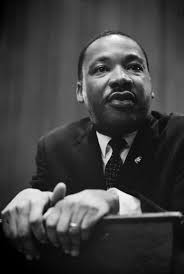On January 15, 1929, a baby boy was born. This baby boy was African American born in the Deep South. He suffered much from depression through his whole life, and as a 12 year old, when his grandmother died, he felt that he was somehow to blame and jumped out of a second story window, but survived. He often suffered what he would later identify as the humiliation of the way the dominant white society treated him and others because of their African American identity.
I wonder if any of these particular facts of the life of Martin Luther King, Jr. had not been true, would we have known him? Would we have heard his voice? Would our world and certainly our country have felt the force and direction of his life?
These were some of the facts of the early life of King. Any neutral observer might have concluded that being born into an African American family in the 1920’s in the Deep South (or anywhere else in the US) was going to be a difficult life. That birth came with it immediate hardships and in the long term that humiliation that could not be avoided. It would mean birth into a sea of injustice, cruelty and trouble.
The voices of prophetic men and women are most often born out of these kinds of troubles, these kinds of cruelty, these kinds of injustice. Those voices and lives that change the course of human history, that leave subsequent generations feeling the impress of their having lived come from a Muse that I want to call the human condition.
We all have one–a human condition–and I suspect that in examining our individual conditions, we find things in them and about them that we would exchange for something better if we could. There is a certain kind of inspiration and creativity that comes, though, from embracing our human condition and living into it.
King did that. Reflecting on his own life and in particular what he might want someone to say at his funeral, he wrote these words:
I’d like somebody to mention that day that Martin Luther King Jr. tried to give his life serving others. I’d like for somebody to say that day that Martin Luther King Jr. tried to love somebody.
I’d want you to say that day that I tried to be right on the war question. I’d want you to be able to say that day that I did try to feed the hungry. I’d want you to be able to say  that day that I did try in my life to clothe the naked. I’d want you to say on that day that I did try in my life to visit those who were in prison. And I’d want you to say that I tried to love and serve humanity.
that day that I did try in my life to clothe the naked. I’d want you to say on that day that I did try in my life to visit those who were in prison. And I’d want you to say that I tried to love and serve humanity.
Yes, if you want to, say that I was a drum major. Say that I was a drum major for justice. Say that I was a drum major for peace. I was a drum major for righteousness. And all of the other shallow things will not matter. I won’t have any money to leave behind. But I just want to leave a committed life behind. And that is all I want to say. If I can help somebody as I pass along, if I can cheer somebody with a well song, if I can show somebody he’s traveling wrong, then my living will not be in vain.
A little boy born in 1929 under the conditions of his own life became this man. The world is different now, in many ways because of him, and his voice continues to inspire, lead and challenge us.
What are the conditions of your life? How to do they propel you forward into some new work that the world needs, now?
Bob Patrick
